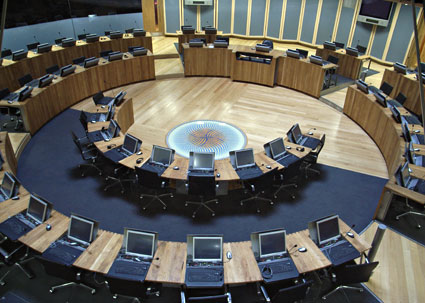- The head of the Welsh Local Government Association said that the devolution of council tax benefit to Wales is “a potential disaster”. The Welsh Government complained that they haven't had enough time to prepare for the changes - which are due to come into force later in 2012.
- Communities and Local Government Minister, Carl Sargeant (Lab, Alyn & Deeside), said that plans to reduce the number of front-line police officers in Wales will have a “serious and adverse impact” on public safety. A total of £96m in savings on policing are due in Wales by 2015.
- The Assembly's Finance Committee reported on borrowing powers, making recommendations that include : giving the Assembly the power to borrow for capital spending, controls agreed with Westminster, switching from revenue to capital spending without Treasury approval as well as taking into account similar developments and processes in Scotland.
- GPs have been told by the Welsh Government that they will not have to open on Saturday's if there's no demand. Welsh Labour had a manifesto pledge in the 2011 election to widen access to GP's surgeries at weekends and evenings.
- Glamorgan and Newport universities unveiled plans to merge, which is said would allow them both to compete “on the world stage”. Cardiff Metropolitan University continues to resist joining the merger.
- Single-use carrier bag use in Wales has fallen by up to 90% since the introduction of a 5p charge in 2011. A poll suggests that 82% of shoppers now support the charge, compared to 61% before it was introduced.
- The Assembly voted in favour of lowering the voting age to 16, with widespread support from across all parties. Darren Millar AM (Con, Clwyd West) suggested that the move would be “inconsistent” with gambling or alcohol ages. The Assembly, however, has no power to change the voting age, and the Welsh Government have instead called on the Electoral Commission to consider the move.
- Mark Drakeford AM (Lab, Cardiff West) refused to back the First Minister's suggestion - that the UK's nuclear submarine fleet moves to Milford Haven in the event of Scottish independence -during a Plaid Cymru sponsored debate.
- Plaid Cymru repeated calls for a not-for-profit company to take control of Welsh rail services when the Arriva Trains franchise is up for renewal in 2018, after Labour are reported to have been considering the option for English railways.
- Deputy Minister for Agriculture, Fisheries & European Programmes, Alun Davies (Lab, Blaenau Gwent), has undertaken a “stock take” of the Glastir land management scheme, finding that there were no compelling arguments for alternatives to the scheme, initiated by the previous Welsh Government, and promising a “period of stability.”
- Health Minister Lesley Griffiths (Lab, Wrexham) has been accused of “gagging” community health councils (CHC's) with regard reorganisations within the Welsh NHS. The Minister said that CHC's needed to consider the needs of all of Wales, and shouldn't “divulge sensitive information” from health boards. The Conservatives have described this as “oppressive”.
- In a separate incident, Darren Millar AM accused the Health Minister of “conniving” with the authors of an “independent” report into future changes to the Welsh NHS. A series of e-mails were obtained, which suggests that parts of the report were “sexed up” to make the Welsh Government's reorganisation plans more attractive. In an urgent question, the Health Minister strongly denied this, saying that the report was “based on clinical evidence.” Lesley Griffiths survived a subsequent Liberal Democrat sponsored no-confidence motion by 29 votes to 28 on July 18th.
- School inspectorate Esytn said that pupils taking the Welsh Baccalaureate qualification were not “being challenged enough”. The Welsh Government have said that there are introducing grading to the Advanced Level course for 2012-13.
- A group, led by former Labour Finance Minister Andrew Davies, called for the devolution of all income tax to Wales. It's claimed devolving the tax would “improve accountability”, and that income tax revenues represent nearly a third of the Assembly's annual budget.
- The First Minister reiterated his calls for a “constitutional convention”, saying that England “lacks a voice on the future of the UK.”
- The UK Government has announced plans for a £500million rail link that would allow direct trains from Wales and the south west of England to Heathrow airport in London. On July 16th, the UK Government also announced a major rail investment scheme, including electrification to Swansea and the Cardiff Valley Lines. A cross-party Assembly group, chaired by Vaughan Gething AM (Lab, Cardiff South & Penarth), successfully campaigned for the electrification programme, along with business consultant Mark Barry. It's believed it could be the first step towards the creation of a “metro system” in the south of Wales.
- Darren Millar AM won the ballot to introduce a Bill to the Assembly, and is proposing a 5p levy on chewing gum to help pay for litter clearing.
- An ICM opinion poll, conducted on behalf of the Silk Commission, found that two-thirds of people support the devolution of income tax, while 80% supported borrowing powers.
- Education Minister Leighton Andrews (Lab, Rhondda) placed Pembrokeshire County Council under a special board of control, after he said he has “little confidence in certain officers” following a child abuse scandal at a Pupil Referral Unit in 2009.
- The First Minister claimed that he has left UK Prime Minister David Cameron with “food for thought” about changes to the electoral system for the National Assembly. The First Minister reiterated his belief that changes to the electoral system for the Assembly should be decided in Wales. The UK Government earlier denied giving the First Minister “any assurances” that there would be no changes to the Assembly's electoral arrangements without the Assembly's agreement.
- The first census data from 2011 reveals that the population of Wales has risen to 3.06million, with 90% of that growth attributed to migration, mostly from other parts of the UK.
- Elin Jones AM (Plaid, Ceredigion) was elected Plaid Cymru's deputy leader on July 17th.
- Dafydd Elis-Thomas AM (Plaid, Dwyfor Meirionnydd) had the party whip temporarily withdrawn, after failing to provide a “satisfactory answer” for his absence from the no-confidence motion against Lesley Griffiths on July 18th.
- Unemployment in Wales increased by 2,000 in the three months to July 2012, to stand at 9%, while unemployment across the UK as a whole, fell to 8.1%.
- The Assembly entered recess on July 18th, set to reconvene on September 25th.
- Milk processors and dairy farmers agreed a draft deal at the Royal Welsh Show over milk prices. Milk producers will be given more bargaining power, in a deal Deputy Minister for Rural Affairs Alun Davies described as being able to “deliver real change.”
- Four times as many over-50s are diagnosed with malignant melanoma in Wales compared to 30 years ago, according to Cancer Research UK.
- According to an Office for National Statistics survey, people living in Wales were the most dissatisfied people of the Home Nations, with people in the South Wales Valleys significantly more dissatisfied with their lives than those in more rural areas.
- Estyn recommended that Anglesey's education services be placed in special measures, after judging them to be “unsatisfactory”, citing poor attendance, poor standards and poor leadership.
- The UK Government blocked the first Bill passed by the Assembly. The Local Government Byelaws Bill was awaiting Royal Assent, but has now been referred to the Supreme Court after - apparently - modifying the role of UK Ministers without their consent – which is outside the Assembly's competence.
Projects announced in July include : an £800million gas power station in Wrexham, an expansion of the door-to-door Bwcabus service in Carmarthenshire and a £425million deal with BT to provide “next generation broadband” to 96% of Welsh households by 2015.























